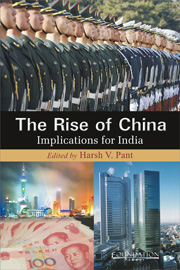Book contents
- Frontmatter
- Contents
- List of Contributors
- Preface
- 1 Introduction
- Part I Domestic Developments in China
- Part II China's Foreign Policy
- 5 China in the Asia-Pacific and Indian Ocean Region: A State of Flux
- 6 China and the United States: Jostling Begins
- 7 China's Resource Diplomacy: India Struggles to Catch-up
- Part III China's India Policy
7 - China's Resource Diplomacy: India Struggles to Catch-up
from Part II - China's Foreign Policy
Published online by Cambridge University Press: 05 June 2012
- Frontmatter
- Contents
- List of Contributors
- Preface
- 1 Introduction
- Part I Domestic Developments in China
- Part II China's Foreign Policy
- 5 China in the Asia-Pacific and Indian Ocean Region: A State of Flux
- 6 China and the United States: Jostling Begins
- 7 China's Resource Diplomacy: India Struggles to Catch-up
- Part III China's India Policy
Summary
It is natural for all countries in the world to depend on resources for their economic development, but the case of the People's Republic of China (PRC) is special, considering its rapidly rising economy and increasing global profile; what will be the international impact from the rise of China as a resource-backed economic giant and what should be the responses to the same, have become key questions for rest of the nations in the world.
The existing energy situation in the PRC needs to be addressed first. By all indications, it appears not promising, prompting the government to urgently revamp its energy policies. Notwithstanding the impressive economic achievements made since the launching of reforms in 1978, there is still no visible improvement in China's access to energy domestically. The country continues to lack adequate oil and other energy resources at home, essential for sustaining its growth; there is a deep mismatch within China between its energy production level and the total domestic energy consumption. High consumption has been due to the government's stress so far on exports and investing in the capital-intensive manufacturing sector, for which a remedy has been sought through the 11th Five Year Plan (2006-10). Also, the PRC's efforts to exploit the potentials of new sources in the western and southern provinces of Xinjiang and Tibet are yet to maximise and its offshore production activities are being hampered by the competing claims of neighbouring nations on maritime borders.
- Type
- Chapter
- Information
- The Rise of ChinaImplications for India, pp. 166 - 192Publisher: Foundation BooksPrint publication year: 2012

